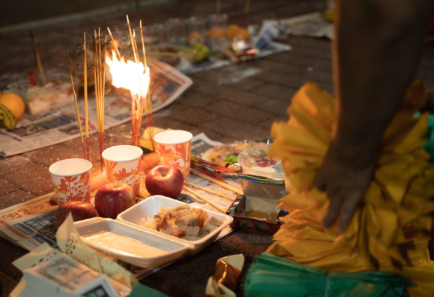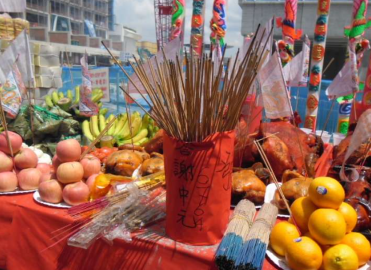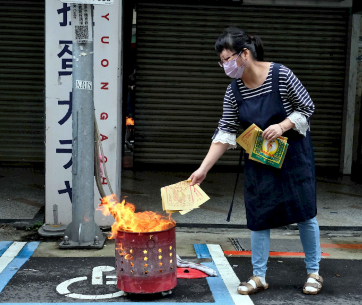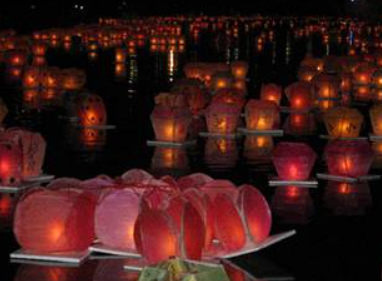What is the Hungry Ghost Festival in China?(2024)
October 10, 2023
Recently in one of my online classes, a Chinese student refused to turn her camera on for the first ever time. When I queried her on the decision, she nervously revealed that ghosts may appear behind her on the screen at any moment. Dismayed, I wondered why she believed ghosts to be such a real and present danger.
She explained that it was nothing to be alarmed about - it was simply the time of the Hungry Ghost Festival, and refusing to see yourself in the mirror - or on camera - was standard protocol. She added that, at this time of year, the gates of the underworld spring open and the spirits of the dead can be seen roaming among the living. Keen to avoid any mid-lesson paranormal events, I was happy to approve her decision and we proceeded with the camera off.
This disquieting episode piqued my interest in China’s Hungry Ghost Festival. China has its fair share of interesting celebrations, from the Dragon Boat Festival to the Lantern Festival, but this one for me is the most interesting. In this article, I’m going to tell you all about the Hungry Ghost Festival, exploring its historical origins, traditions, and the taboos associated with it.
What is the Hungry Ghost Festival?
When is the Hungry Ghost Festival celebrated in China?
Why do the Chinese celebrate the Hungry Ghost Festival?
How do Chinese people celebrate the Hungry Ghost Festival?
What not to do during the Hungry Ghost Festival and Ghost month?
Useful phrases for the Hungry Ghost Festival in Chinese
Conclusion
What is the Hungry Ghost Festival?
The Hungry Ghost Festival, known in Chinese as 盂兰节 yú lán jié or 中元节 zhōng yuán jié, is a festival with over one thousand years of history celebrated in China, Singapore, Malaysia, and parts of Thailand and Vietnam. The festival can be considered China’s unique answer to Hallowe’en.
When is the Hungry Ghost Festival celebrated in China?
The Hungry Ghost Festival is celebrated on the 15th day of the seventh lunar month. This month is often referred to as 鬼月 (guǐ yuè), or "Ghost Month", and it typically falls in August or September on the Gregorian calendar. The date can vary somewhat from year to year based on the workings of the lunar calendar. In 2024, the Hungry Ghost Festival will be celebrated on August 18th.
Why do the Chinese celebrate the Hungry Ghost Festival?
The origins of the Hungry Ghost Festival derive from ancient Chinese folklore and Buddhist beliefs. It is believed that, during the seventh lunar month, the gates of the underworld open, allowing spirits and ghosts to roam freely in the mortal world. Contrary to what happens during the Tomb Sweeping Festival, ancestors visit the living, rather than vice versa. Chinese people make it their mission to honour and appease these wandering souls during their brief stay in the land of the living.
How do Chinese people celebrate the Hungry Ghost Festival?
The Hungry Ghost Festival is celebrated with a wide variety of customs and traditions.
Family dinner
Step one is typically to invite your family round for a feast in honour of your ancestors. Many families will prepare only vegetarian dishes, in keeping with Buddhist tradition. Extra places are set at the table for the visiting deceased, and ideally, their favourite dishes are served.

Offerings to the spirits
Once dinner has been negotiated, families will then prepare elaborate altars where offerings will be made to their ghostly comrades. These are typically set up on the street outside, ensuring that the ghosts are kept a safe distance from the home. Food and beverages will be provided, and foods with symbolic significance are particularly favoured. Notable examples include Chinese lettuce, which embodies prosperity; pineapple, which invites good luck; and noodles, which symbolize longevity and a well-fulfilled life.

Burning paper money
Another common practice during the festival is the burning of joss paper or ghost money. This paper is intricately designed and often looks convincingly similar to real currency. It is believed that burning ghost money transports it to the spirit world, where it can be used by the deceased to improve their conditions in the afterlife.
In China, you're likely to find locals burning joss papers at crossroads and street corners during the Hungry Ghost Festival, and if you do, take care to show respect to the ritual area. In other words, do not touch, take, or interfere with the burning joss paper, ashes, or offerings in any way; do not step on or over them, but rather walk around them if possible; do not make any disruptive noises when passing by or observing the ritual; do not mock the ritual or take photographs without permission, and lastly do not litter around the ritual area.

Theatrical performances
In some regions of China, street performances and traditional Chinese opera are staged as part of the celebrations. These performances aim to entertain both the living and the deceased and often depict stories from Chinese folklore and mythology.
Guiding spirits back to the afterlife
As festivities draw to a close, people float water lanterns (also known as lotus lanterns) down the river to guide the spirits out of their neighbourhoods and back to the underworld. The moment the lanterns go out symbolises the ghosts’ successful re-entry into the spirit realm.
The primary aim is to ensure that the wandering spirits are content, well-fed fed, and well-remunerated during their stay.

What not to do during the Hungry Ghost Festival and Ghost month?
During the Hungry Ghost Festival and the Ghost Month, there are several measures that people wisely take to avoid incurring bad luck or encountering vengeful spirits. For example, clothes should not be hung out to dry at night as ghosts may feel compelled to approach the human-like shapes - whistling at night is to be avoided for the same reason.
Wearing red or black clothing is also ill-advised, as these colours are associated with death and bad luck. Observing these customs will help keep any unwanted spirits away from you and your family home.
Useful phrases for the Hungry Ghost Festival in Chinese
If you're planning to participate in or discuss the Hungry Ghost Festival in Chinese, here are some useful phrases to get you started:
| Chinese character | Pinyin | Meaning |
|---|---|---|
| 盂兰节 | yú lán jié | Hungry Ghost Festival |
| 中元节 | zhōngyuán jié | Hungry Ghost Festival |
| 盂兰节快乐 | yú lán jié kuàilè | Happy Hungry Ghost Festival! |
| 中元节快乐 | zhōngyuán jié kuàilè | Happy Hungry Ghost Festival! |
| 鬼 | guǐ | Ghosts |
| 鬼月 | guǐ yuè | Ghost Month |
| 鬼门开 | guǐ mén kāi | The ghost gate is open |
| 祖先 | zǔxiān | Ancestors |
| 祭祖 | jì zǔ | Ancestor worship |
| 香 | xiāng | Incense |
| 烧香 | shào xiāng | To burn incense |
| 纸钱 | zhǐ qián | Paper money |
| 烧纸钱 | shāo zhǐ qián | To burn paper money |
| 神坛 | shén tán | Altar |
| 祭品 | jìpǐn | Offerings |
| 宝莲灯 | bǎo lián dēng | Lotus lantern |
Conclusion
The Hungry Ghost Festival in China is a captivating and culturally rich celebration that offers a fascinating window into Chinese beliefs and traditions. It's a reason for families to come together and pay respects to their visiting ancestors, and it’s a fun and interesting time to be a foreigner in China.
As you explore the intriguing customs and taboos associated with this festival, you'll gain a deeper appreciation for the cultural diversity that makes China such a remarkable place. Whether you're learning Chinese, living in China, or just curious about Chinese culture, the Hungry Ghost Festival is an excellent opportunity to immerse yourself in the mysteries and traditions of this ancient land. So, next time you find yourself in China during the seventh lunar month, don't forget to join in the festivities (and keep your camera off at all costs!)
About the Author
David Lee is a Mandarin enthusiast and hotpot fiend hailing from Ireland.
